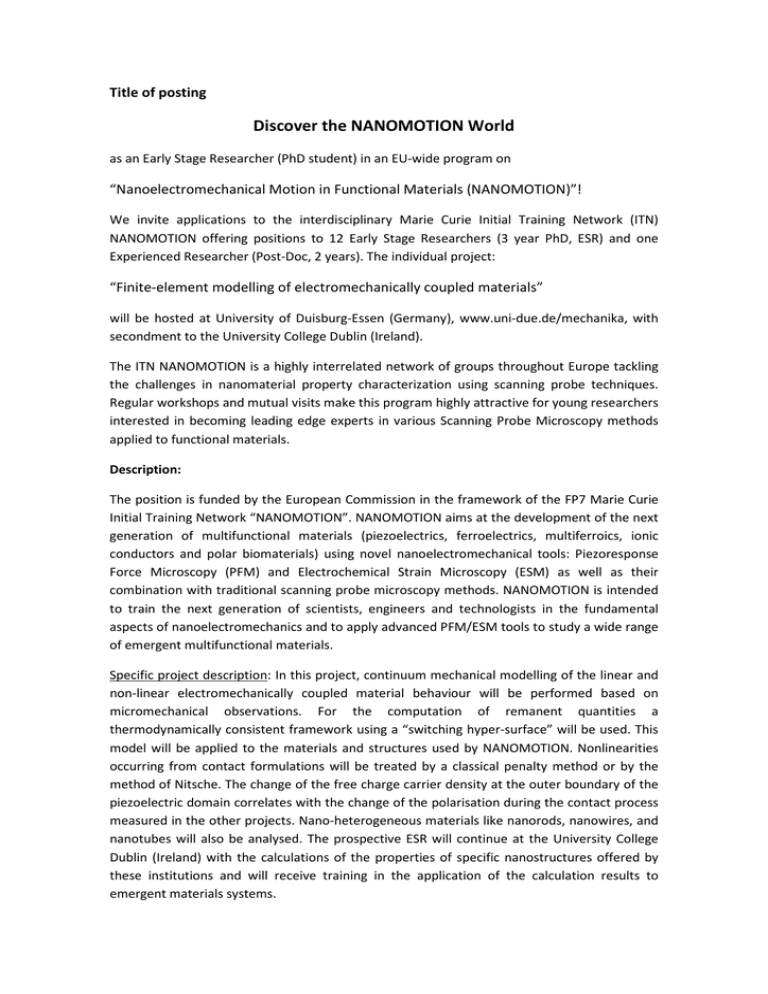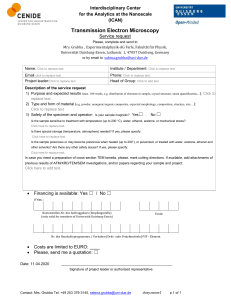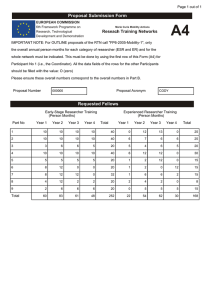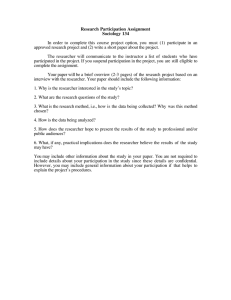Discover the NANOMOTION World Title of posting
advertisement

Title of posting Discover the NANOMOTION World as an Early Stage Researcher (PhD student) in an EU-wide program on “Nanoelectromechanical Motion in Functional Materials (NANOMOTION)”! We invite applications to the interdisciplinary Marie Curie Initial Training Network (ITN) NANOMOTION offering positions to 12 Early Stage Researchers (3 year PhD, ESR) and one Experienced Researcher (Post-Doc, 2 years). The individual project: “Finite-element modelling of electromechanically coupled materials” will be hosted at University of Duisburg-Essen (Germany), www.uni-due.de/mechanika, with secondment to the University College Dublin (Ireland). The ITN NANOMOTION is a highly interrelated network of groups throughout Europe tackling the challenges in nanomaterial property characterization using scanning probe techniques. Regular workshops and mutual visits make this program highly attractive for young researchers interested in becoming leading edge experts in various Scanning Probe Microscopy methods applied to functional materials. Description: The position is funded by the European Commission in the framework of the FP7 Marie Curie Initial Training Network “NANOMOTION”. NANOMOTION aims at the development of the next generation of multifunctional materials (piezoelectrics, ferroelectrics, multiferroics, ionic conductors and polar biomaterials) using novel nanoelectromechanical tools: Piezoresponse Force Microscopy (PFM) and Electrochemical Strain Microscopy (ESM) as well as their combination with traditional scanning probe microscopy methods. NANOMOTION is intended to train the next generation of scientists, engineers and technologists in the fundamental aspects of nanoelectromechanics and to apply advanced PFM/ESM tools to study a wide range of emergent multifunctional materials. Specific project description: In this project, continuum mechanical modelling of the linear and non-linear electromechanically coupled material behaviour will be performed based on micromechanical observations. For the computation of remanent quantities a thermodynamically consistent framework using a “switching hyper-surface” will be used. This model will be applied to the materials and structures used by NANOMOTION. Nonlinearities occurring from contact formulations will be treated by a classical penalty method or by the method of Nitsche. The change of the free charge carrier density at the outer boundary of the piezoelectric domain correlates with the change of the polarisation during the contact process measured in the other projects. Nano-heterogeneous materials like nanorods, nanowires, and nanotubes will also be analysed. The prospective ESR will continue at the University College Dublin (Ireland) with the calculations of the properties of specific nanostructures offered by these institutions and will receive training in the application of the calculation results to emergent materials systems. Nr. of job position: ESR4 Research Fields Mechanical Engineering, Physics Career Stage Early Stage Researcher (postgraduate) Benefits Employment as a PhD student with competitive salary is offered. The position entitles to participation in international conferences and NANOMOTION workshops. Local salary legislation applies (salary according to German TV-L E13, 100%). University of Duisburg-Essen is an equal opportunity employer (received the „Total-E-QualityAward“) putting strong emphasis on diversity management and cultural integration. Competences brought to the University by diversity of age or cultural background are highly honoured (http://www.uni-due.de/diversity). Applications of handicapped or equivalent are encouraged (compare legal § 2 Abs. 3 SGB IX). The University of Duisburg-Essen seeks to increase the number of female scientists and highly encourages applications. Women are given preference within the measures of the Landesgleichstellungsgesetz (Nordrhein-Westfalen, Germany). Comment/website for additional job details Please, send your application to this project (including motivation letter, CV, copy of University certificates, names of two referees all in ONE pdf or Word document using your name and number of position as filename) to (nanomotion.esr4@uni-due.de). Please use NANOMOTION application and number of position (ESR4) in the email subject line. Applications directly to the group members will not be accepted. Only use the given email address. For further information and other job offers please visit: www.ITN-Nanomotion.eu. Requirements Degree: Master or equivalent (minimum 8 semester university studies) Degree field: Engineering/Physics/Applied Mathematics Main research field: Mechanical Engineering/Physics/Continuum Mechanics/Civil Engineering/Mathematics Research subfield: Electromechanics Years of Research Experience: < 4 years after degree Required Research Experience: Physics/Mechanical Engineering Research Sub Field: Experience with finite element analysis Language English Language level: Proficiency in spoken and written English Further Requirements: The candidate should have MSc or equivalent degree in Engineering, Physics or Applied Mathematics allowing to start a doctoral fellowship. Profound knowledge of English (both written and spoken) is required. The candidate should have initial knowledge either on materials property calculations or FEM analysis. EU imposes strict requirements on eligibility: At the time of recruitment the researcher must not have resided or carried out his/her main activity (work, studies, etc…) in the country of the beneficiary (Germany) for more than 12 months in the 3 years immediately prior to his/her recruitment under the project. He/she also should have less than 4 years of research experience. This is measured from the date they obtained the degree which formally entitles them to embark on a doctorate, either in the country in which the degree was obtained or in the country in which the research training was provided. Timeline: The position is opened from January 1st, 2012. Applications are considered on a continuous basis until a suitable candidate is identified.





